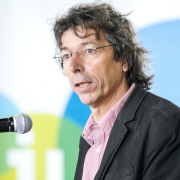
Copyright : Laboratoire LEMAR- 2018
Yves-Marie PAULET (LEMAR) et Céline LIRET (Oceanopolis)
Regional
European project
Région (CPER), CG29 (département Finistère), UBO et Union Européenne
Start Date
02/04/2025
End Date
02/04/2025
The “OCEANOLAB” project has the objective of associating, jointly and simultaneously, research activities and the sharing of scientific and technological, marine and maritime knowledge, by bringing together actors from the fields of research, innovation and scientific culture. This project is the result of a collaboration between Brest, bringing together local scientific partners and Océanopolis. This project represents an original opportunity to meet the needs of the various stakeholders by pooling skills and knowledge. The teams at Océanopolis, an ocean discovery centre, have more than 20 years of experience in aquariology, animal husbandry and seawater treatment. This experiment will be made available to the scientific community to enable experiments in marine ecology to be carried out under optimal conditions. The reception of research work and associated teams on the Océanopolis site will also make it possible to offer the public “visible”, instantaneous and lively scientific news. In a first phase, this project consists in developing an existing space at Océanopolis for the establishment of experimental structures dedicated to different research axes in the field of marine ecology and global change. The scientific culture activities of the OCEANOLAB project will be closely associated with these research and development themes. A set of mediation mechanisms will be implemented to ensure that all citizens have access to knowledge in marine science and technology and thus contribute to developing the interest of the youngest in its research fields.
This experimental platform project in marine ecology involves the staff of the various LEMAR teams. Two pilot projects will be carried out from 2019. One of these projects will focus, for example, on the effects of climate change (temperature increase) on the ecophysiology of marine molluscs (abalone and scallops).
– Ifremer centre de Brest (DYNECO)

 SeaTraM
Scroll to top
SeaTraM
Scroll to top